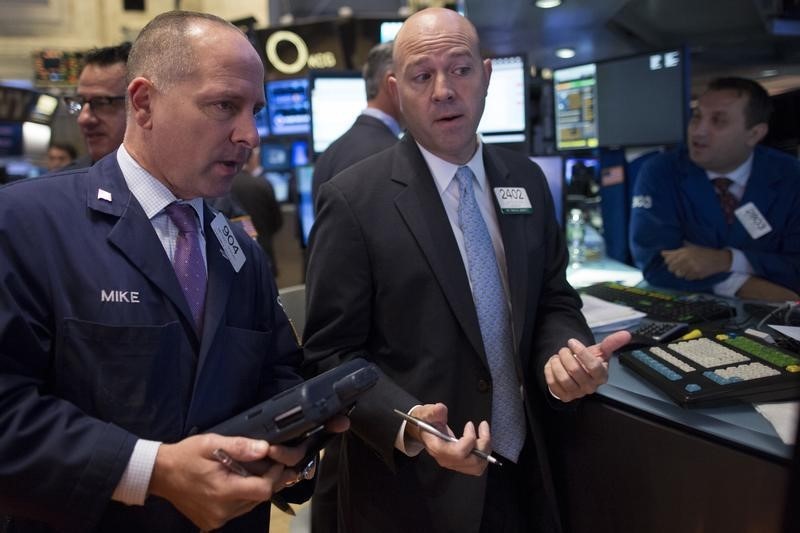By Caroline Valetkevitch
(Reuters) - U.S. stocks fell on Tuesday, with the Dow snapping a seven-day winning streak, on renewed fears of slowing growth in China and another bout of selling in biotech shares.
Biotechs led the S&P 500 and Nasdaq lower and the S&P health care index <.SPXHC>, down 1.2 percent, had the biggest losses among S&P sectors, followed by industrials <.SPLRCI>, down 1.1 percent. The Nasdaq Biotech Index (NBI) was down 3.2 percent, extending recent declines.
Worries about third-quarter earnings reports continued to weigh on sentiment. Earnings for S&P 500 companies are expected to have dropped nearly 5 percent year over year, which would be the worst quarter for earnings in six years, according to Thomson Reuters data.
"There's a little nervousness about earnings reports that we'll be seeing over the next couple or three weeks," said John Carey, portfolio manager at Pioneer Investment Management in Boston.
"The international situation continues to weigh on people's minds, and commodities were weaker earlier. In the absence of any strong new economic data or blow-away-type earnings results, people are still cautious, waiting for the Fed to decide on whether it's going to raise rates or not," he said.
After the bell on Tuesday, shares of Intel (O:INTC) were nearly flat in choppy trade following results, while shares of JPMorgan Chase (N:JPM), which also reported results, were down 1.7 percent.
Earlier in the day, data showed Chinese imports fell 20 percent in September due to weak domestic demand, indicating growth in the world's second-largest economy was sputtering.
The Dow Jones industrial average (DJI) fell 49.97 points, or 0.29 percent, to 17,081.89, the S&P 500 (SPX) lost 13.77 points, or 0.68 percent, to 2,003.69 and the Nasdaq Composite (IXIC) dropped 42.03 points, or 0.87 percent, to 4,796.61.
A devaluation of China's yuan currency in late August triggered a steep selloff in global equities. A bounce in commodities has helped stocks recover in recent sessions, as well as investors' bets that the Federal Reserve will keep benchmark U.S. interest rates near zero until next year.
Among results on tap this week are reports from more big banks and other earnings bellwethers, including Goldman Sachs (N:GS), Bank of America (N:BAC), and General Electric (N:GE).
Shares of Ryder System (N:R) were down 9.3 percent at $68.63 - the biggest percentage decliner on the S&P 500 - while FMC Corp (N:FMC) was down 3.1 percent at $36.35, both following disappointing forecasts late Monday. Ryder's stock hit its lowest close in nearly two years.
Molson Coors (N:TAP) rose 9.9 percent to $86.58 after SABMiller (L:SAB) agreed to be bought by AB Inbev (BR:ABI) for about $106 billion. The deal is likely to result in the disposal of SAB's 58 percent stake in its U.S. joint venture with Molson Coors.
Declining issues outnumbered advancing ones on the NYSE by 2,222 to 835, while on the Nasdaq, 2,039 issues fell and 763 advanced. The S&P 500 posted 12 new 52-week highs and four new lows; the Nasdaq recorded 61 new highs and 47 new lows.

About 6.1 billion shares changed hands on U.S. exchanges, below the 7.5 billion daily average for the past 20 trading days, according to Thomson Reuters data.